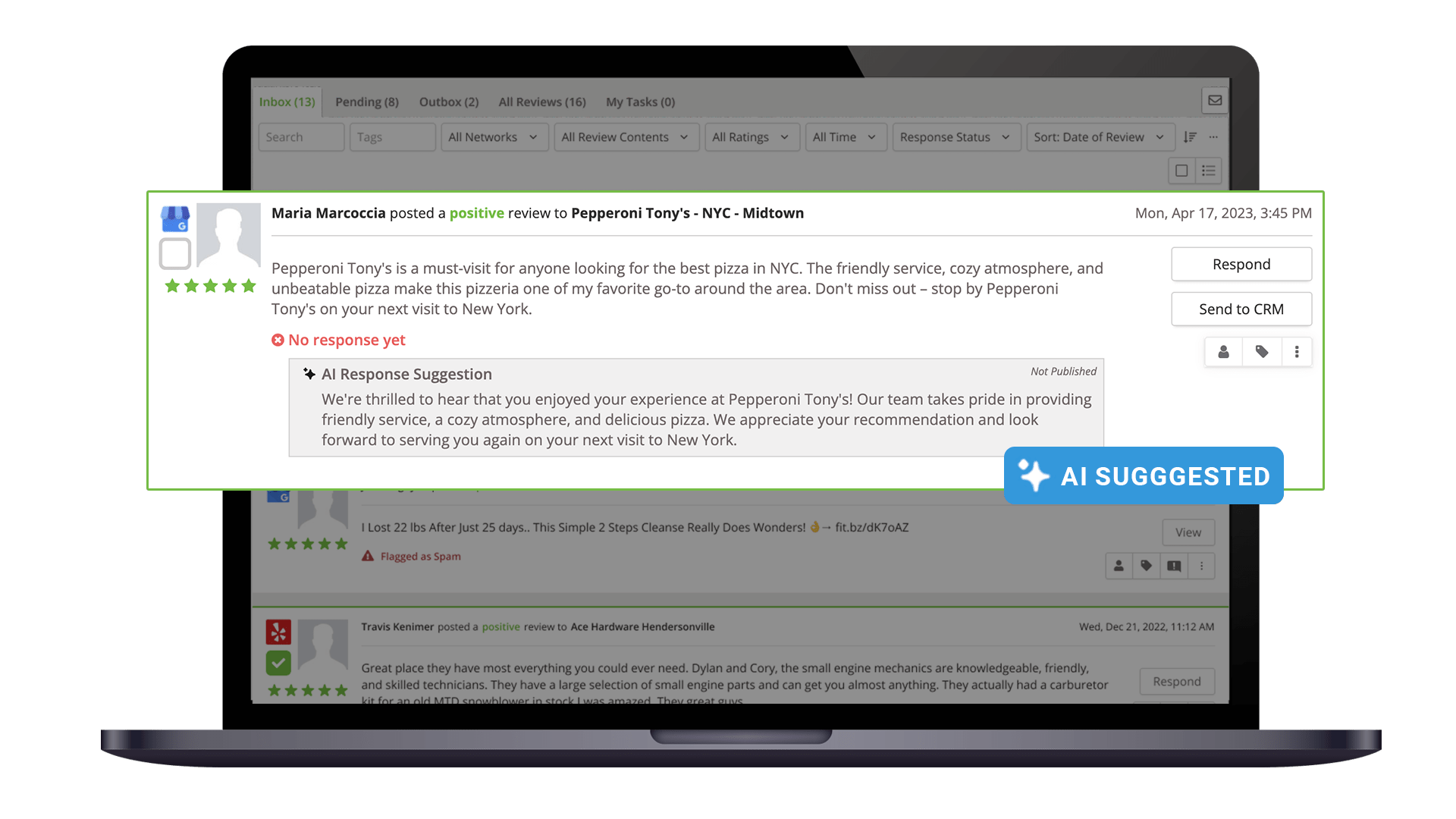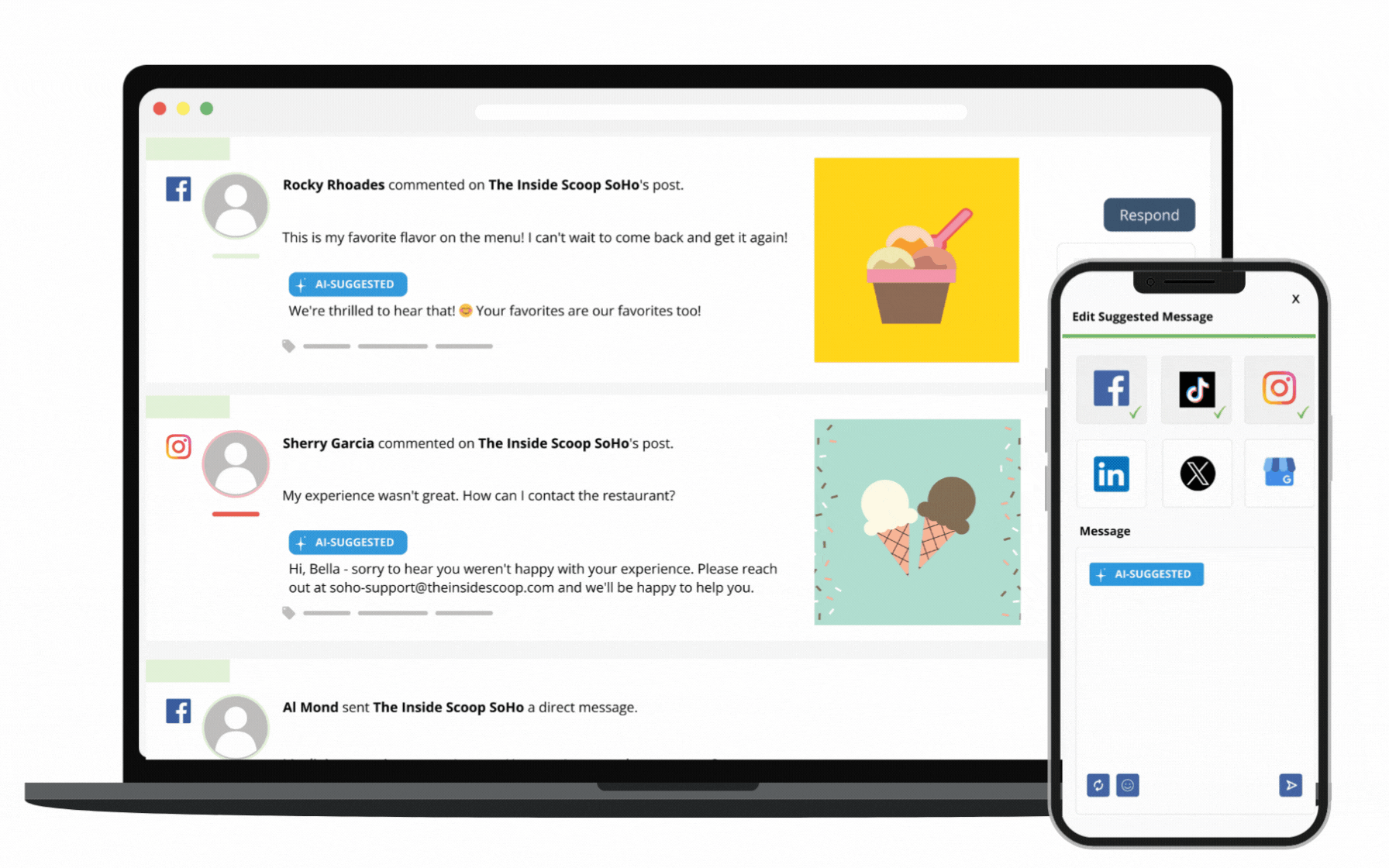How to Meet Consumers’ Local Marketing Expectations
Table of Contents
Today, nine in ten Americans own a smartphone. Consumers are constantly looking for local businesses to purchase from with their smartphones. However, consumers are faced with a multitude of options, each competing for their attention simultaneously.
For multi-location businesses, local marketing means managing 100s or 1,000s of locations’ online profiles across multiple platforms.
In this article, we’ll explain how consumers search locally today and what they care about most. We’ll also offer essential local marketing tactics to ensure your brand stands out from the crowd and wins more customers.
What Are Consumers Searching For?
According to our Consumer Behavior Index (CBI), which surveyed more than 1,000 consumers about their local shopping habits and preferences, 80% of respondents search for local businesses at least once a week, and 32% do so daily.
As you’d expect, restaurants, grocery stores, and retail outlets are among the most searched-for businesses by consumers. Yet, a broad spectrum of local businesses also captures significant monthly search interest, underscoring the diverse priorities of consumers.
How are Consumers Searching?
Evidently, consumers frequently search for local businesses, but how are they searching? Do their search habits differ by demographics, such as age group?
Preferred Devices and Overall Satisfaction
For one, most consumers use smartphones (66%), laptops or desktops (24%), or tablets (7%) to search for local businesses. Smartphones are the clear winner for consumers 18-54, with 76% of this age group using primarily smartphones to look up information about local businesses. Only those 65+ use laptops or desktops (48%) more than smartphones (40%) to search for local companies.
When asked about overall satisfaction with online tools (smartphone apps, websites, and search engines) to find local businesses, the vast majority were satisfied with 55% responding “highly satisfactory” and 44% stating they were “moderately satisfied.”
For the most part, consumers are satisfied with local search tools, but you must optimize your website for mobile, desktop, and tablets. Otherwise, you risk upsetting and losing customers.
Consumer Search Trends by Age
Our CBI data revealed that consumers’ local search behaviors and preferred platforms vary greatly by age. Here’s how they differ:
Gen Z
Sixty-seven percent of 18-24 year olds, or adult Gen Zers, use Instagram most frequently to look up local businesses. TikTok ranks second at 62%, followed by Google Search at 61%.
Millennials
When looking at those ages 25-44, or mostly millennials, Google Search is the most popular platform, with an average of 72%, followed by Facebook at 63%. Interestingly, for consumers 25-34, Instagram comes in third at 54%, barely edging out Google Maps at 50%.
Gen X and Boomers
For the age groups 45 and beyond, Google Search is the most favored local search platform, with three-quarters of these older consumers using it most. Google Maps comes in second at 54%.
Unsurprisingly, social media as a local research tool dwindles for all three of the remaining age groups. However, out of the social media platforms, these older consumers use Facebook most often at 46%.
Action Items
As you can see, local search preferences vary drastically by age group. Ideally, your brand needs to appear on all of these local search and social platforms.
However, depending on your target audience and demographic, you’ll want to put more effort into some platforms than others. For instance, if you’re a retail company whose primary audience is Gen Z, you need robust Instagram and TikTok profiles that create engaging content for followers to interact with and share. Alternatively, if your target audience is 45 and older, spending your resources on those platforms may not have as much of a return.
It’s also important to optimize your local listings on Google Maps and Search as they’re one of the more preferred local search platforms across the board, particularly for older consumers.
And lastly, since over three-quarters of consumers use smartphones to find local businesses, you must make your website and local landing pages mobile-friendly. This improves your user experience (UX) and is a local organic ranking factor.
Read our local SEO guide to learn how to improve your local search rankings and drive more traffic to your stores.
What Impacts Consumers’ Decisions?
Our CBI survey asked consumers, “When deciding whether to visit or contact a local business, please rate each of the following factors as high priority, moderate priority, and low priority.” Below are the results in order of highest priority.
To little surprise, quality and cost of goods are the two highest priorities for consumers. However, it’s worth noting that the accuracy of business information comes in third at 60%. Other note-worthy factors are brand reputation, personal recommendations, and online customer feedback.
Action Items
These findings reiterate the need for accurate business information across all local listings, social pages, and landing pages. Furthermore, you should generate local social media posts and Google Posts, showcasing your quality products or services at competitive prices. Also, your brand reputation and customer feedback have a significant impact, which we’ll explain next.
Do Ratings, Reviews, and Social Engagements Still Matter?
As seen above, online ratings and reviews impact consumers’ purchasing decisions. Our CBI research further supports this notion:
- Eighty-seven percent of consumers regularly read reviews before making a purchase decision.
- Sixty-four percent of respondents read four or more reviews before contacting or visiting a local business.
- In a five-star rating system, 77% of people believe a business must have a minimum of three stars to even be considered.
Clearly, consumers value and depend on reviews. Our previous research, The State of Google Reviews, found that improved ratings increase conversions. We found that Google Business Profiles (GBPs) conversions improve by 44% when a business increases its average star rating by one full star.
Moreover, consumers are interested in how businesses respond to online reviews or social media engagements. However, local businesses aren’t always meeting customer expectations.
- Over eight in ten consumers write reviews of local businesses at least occasionally.
- What’s troubling, though, is that only half of consumers were satisfied with the response they received from a business, and only 30% received a response quickly (1-2 days).
- Forty-one percent of consumers actively look to see whether a business responds to its online reviews and are likelier to choose a company that does respond.
Online reviews aren’t the only type of local engagements that matter. We found similar results when polling consumers about engagements on local listings and social media profiles.
Over eight in ten consumers occasionally leave comments or questions for local businesses on their online profiles, and only 31% received a response within 1-2 days. Moreover, less than half (48%) were satisfied with the business’s response.
These research results reveal that local businesses aren’t meeting consumers’ expectations when responding to online engagements or reviews.
Action Items
The lack of reviews and ratings, not responding to reviews or engagements, and negative reviews impact customer loyalty and brand reputation. We recommend two strategies: Acquiring more reviews and engagements and responding to them.
Acquiring More Reviews and Engagements:
To acquire more reviews and engagements, we recommend encouraging customers to leave more reviews by making it easy to leave reviews. You should also ask for reviews after different touch points along the buyer journey. To acquire more social media comments, post engaging content such as polls, surveys, or questions that ask followers’ opinions. You can also produce more short-form videos, which have a high engagement rate.
Managing Online Reviews and Engagements
Maintaining a robust online presence requires managing and promptly responding to both positive and negative reviews or comments, ideally within a 24-hour timeframe.
Your company must become less siloed to achieve a strong reputation management strategy. To generate on-brand responses, you need processes and templated responses between your customer service, social media, and marketing teams.
You also want to ensure you’re utilizing sentiment analysis to track and measure how local customers feel about your locations and brand, and make optimizations accordingly.
How SOCi Helps Multi-Location Enterprises Dominate Their Local Markets
As you can see, many factors influence local customers’ behavior and purchase journey. Managing all of these factors is exceptionally challenging for multi-location businesses.
To help, we’ve built SOCi for more than a decade to ensure multi-location businesses rank well on local search and social media platforms, can create engaging content, and have the ability to manage each location’s online reputation.
We’ve enhanced our CoMarketing Cloud with SOCi Genius, an AI automation layer to help automate these daily tasks. For review management, Genius Reviews enables you to generate on-brand and personalized responses to online reviews in seconds. This saves your local or corporate team time and energy and helps improve your local search rankings.
As we’ve seen, engaging content and responding to followers’ comments and questions on social media is vital. To ease the daily and manual burden of social media marketing, we created Genius Social.
Genius Social analyzes previous social media content to create on-brand and location-specific content. Like Genius Reviews, Genius Social can create on-brand and engaging responses to comments or questions followers or potential customers leave.
To dominate local markets, you need a partner to help manage and elevate these local ranking factors and improve customer engagements. Request a demo today to learn more about SOCi’s AI capabilities and how we can enhance your local marketing strategy!







